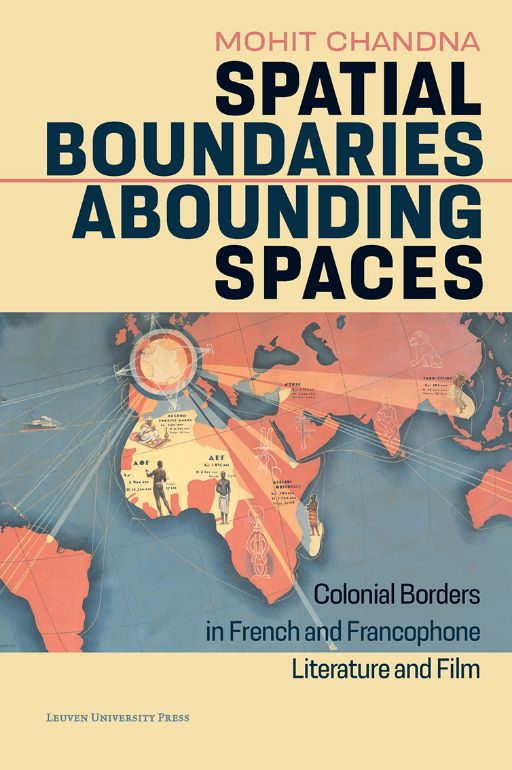
Mohit Chandna, Spatial Boundaries, Abounding Spaces. Colonial Borders in French and Francophone Literature and Film
Compte rendu publié dans Acta fabula (avril 2023, vol. 24, n°4) : Repenser les frontières coloniales (Camille Lotz)
*
Colonial expansion and spatial grammar in French-language works from different historical and national contexts
Colonialism advanced its project of territorial expansion by changing the very meaning of borders and space. The colonial project scripted a unipolar spatial discourse that saw the colonies as an extension of European borders. In his monograph, Mohit Chandna engages with narrations of spatial conflicts in French and Francophone literature and film from the nineteenth to the early twenty-first century. In literary works by Jules Verne, Ananda Devi, and Patrick Chamoiseau, and film by Michael Haneke, Chandna analyzes the depiction of ever-changing borders and spatial grammar within the colonial project. In so doing, he also examines the ongoing resistance to the spatial legacies of colonial practices that act as omnipresent enforcers of colonial borders. Literature and film become sites that register colonial spatial paradigms and advance competing narratives that fracture the dominance of these borders.
Through its analyses Spatial Boundaries, Abounding Spaces shows that colonialism is not a finished project relegated to our past. Colonialism is present in the here and now, and exercises its power through the borders that define us.
Ebook available in Open Access.
This publication is GPRC-labeled (Guaranteed Peer-Reviewed Content).
Table of content
Chapter 1: Introduction: Charting Course
Anchoring Space - Doing Space - Geographies of Literature - Postmodern Spaces – Material - Histories
Chapter 2: Around the World in Eighty (One) Days
Section 1. Understanding Verne: Laying the Groundwork
Verne and the World - Verne’s Geography - Geography on Verne - Reading Verne’s Geographies - Rounding up the World - Capital Repetitions: Monghir
Section 2. Opium Silence and Nineteenth-Century French Literature
Colonizing Hong Kong - Illegal Opium and Colonial Wealth - Opium Cities - Opium Race
Chapter 3: Dislocating the Indian Nation: Ananda Devi’s Homelands
Global Pathways - Along a Local Road - Dislocating Location - Grounding Identity - Patriarchal Homelands - Tango with India - Delhi’s Underbelly - Antipodal Itineraries - Desert Safari - Producing Dissent - Rediscovering India
Chapter 4: Martinique: Space, Language, Gender
Section 1. Contextualizing Texaco
Texaco and its Significations - A Spatial Metaphor - Literary Margins: City and Language - Marie-Sophie as Texaco - Chamoiseau and Feminism - Reinventing the City
Section 2. Martinique’s Literary Identity and French Borders
Martinique: Colonial History, Postcolonial Literature - French Borders, Martinican Text
Section 3. Text, Texaco and Landscape
Texaco: Space and Language - Rewriting l’En-ville
Section 4. France, Martinique and Marie-Sophie’s Body
Marie-Sophie and Texaco - Marie-Sophie’s body and Martinique
Chapter 5: Out of Place: French Family at (Algerian) War 205
Immaterial Differences - Locating Caché - White Lies - Hidden Agenda - Colonial Family; National Lies - Colonial Past; Cinematic Present - Escaping Images - Deadly Images
Epilogue: Interjecting Passages
Notes
Bibliography
About the author
Mohit Chandna completed his doctoral studies at Cornell University, New York, and currently works as assistant professor in the Department of French and Francophone Studies at the English and Foreign Languages University, Hyderabad.